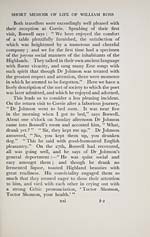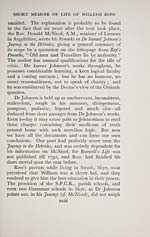Matheson Collection > Gaelic songs
(28)
Download files
Complete book:
Individual page:
Thumbnail gallery: Grid view | List view

SHORT MEMOIR OF LIFE OF WILLIAM ROSS
It is plain that Bos well dreaded incurring his
friend's wrath for this breach of sobriety, and the
biographer is anxious to show that though the great
man could look with an easy toleration on these
harmless convivial proceedings, he went no further.
In the Journey, Dr Johnson puts the matter beyond
a doubt. " The word ' whisky,' " he says, " signifies
water, and is applied by way of eminence to strong
water or distilled liquor. The spirit drunk in the
North is drawn from barley. I never tasted it except
once for experiment at the inn at Inveraray, when I
thought it preferable to any English malt brandy.
It was strong but not pungent, and was free from
the empyreumatic taste or smell. What was the
process I had no opportunity of enquiring, nor do
I wish to improve the art of making poison."
The poet would be 1 1 years of age when the
famous travellers passed by his native hamlet. He
must have heard a great deal about their sayings and
doings, and we cannot but regret, from every point
of view, that the only account he gives of Dr Johnson
differs so completely from the written record left
by Dr Johnson himself and by his biographer. The
two penultimate verses of No. 15 convey a very
different impression from the account of the travellers
themselves. The delinquent, Boswell, gets off without
mention of his lapses, while Dr Johnson is described
not as the genial participant in a merry gathering
at Corrie, but as a sot, engaging in drunken orgies
all through the Highlands. One gathers that this
view prevails in some quarters to this day.
Now though local gossip does much to alter a
tale it could hardly go so far and last so long as this
It is plain that Bos well dreaded incurring his
friend's wrath for this breach of sobriety, and the
biographer is anxious to show that though the great
man could look with an easy toleration on these
harmless convivial proceedings, he went no further.
In the Journey, Dr Johnson puts the matter beyond
a doubt. " The word ' whisky,' " he says, " signifies
water, and is applied by way of eminence to strong
water or distilled liquor. The spirit drunk in the
North is drawn from barley. I never tasted it except
once for experiment at the inn at Inveraray, when I
thought it preferable to any English malt brandy.
It was strong but not pungent, and was free from
the empyreumatic taste or smell. What was the
process I had no opportunity of enquiring, nor do
I wish to improve the art of making poison."
The poet would be 1 1 years of age when the
famous travellers passed by his native hamlet. He
must have heard a great deal about their sayings and
doings, and we cannot but regret, from every point
of view, that the only account he gives of Dr Johnson
differs so completely from the written record left
by Dr Johnson himself and by his biographer. The
two penultimate verses of No. 15 convey a very
different impression from the account of the travellers
themselves. The delinquent, Boswell, gets off without
mention of his lapses, while Dr Johnson is described
not as the genial participant in a merry gathering
at Corrie, but as a sot, engaging in drunken orgies
all through the Highlands. One gathers that this
view prevails in some quarters to this day.
Now though local gossip does much to alter a
tale it could hardly go so far and last so long as this
Set display mode to: Large image | Transcription
Images and transcriptions on this page, including medium image downloads, may be used under the Creative Commons Attribution 4.0 International Licence unless otherwise stated. ![]()
| Early Gaelic Book Collections > Matheson Collection > Gaelic songs > (28) |
|---|
| Permanent URL | https://digital.nls.uk/76606835 |
|---|
| Description | Items from a collection of 170 volumes relating to Gaelic matters. Mainly philological works in the Celtic and some non-Celtic languages. Some books extensively annotated by Angus Matheson, the first Professor of Celtic at Glasgow University. |
|---|
| Description | Selected items from five 'Special and Named Printed Collections'. Includes books in Gaelic and other Celtic languages, works about the Gaels, their languages, literature, culture and history. |
|---|

